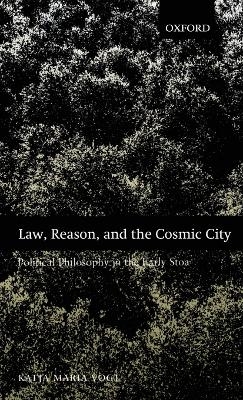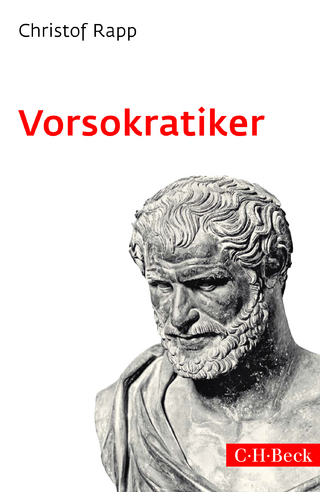
Law, Reason, and the Cosmic City
Political Philosophy in the Early Stoa
Seiten
2008
Oxford University Press Inc (Verlag)
978-0-19-532009-1 (ISBN)
Oxford University Press Inc (Verlag)
978-0-19-532009-1 (ISBN)
This book argues that political philosophy is central to early Stoic philosophy, and is deeply tied to the Stoics' conceptions of reason and wisdom. Broad in scope, it explores the Stoics' idea of the cosmic city, their notion of citizen-gods, as well as their account of the law.
The notions of the cosmic city and the common law are central to early Stoic political thought. As Vogt shows, together they make up one complex theory. A city is a place governed by the law. Yet on the law pervading the cosmos can be considered a true law, and thus the cosmos is the only real city. A city is also a dwelling-place--in the case of the cosmos, the dwelling-place of all human beings. Further, a city demarcates who belongs together as fellow-citizens. The thought that we should view all other human beings as belonging to us constitutes the core of Stoic cosmopolitanism. All human beings are citizens of the cosmic city in the sense of living in the world. But the demanding task of acquiring wisdom allows a person to become a citizen in the strict sense: someone who lives according to the law, as the gods do. The sage is the only citizen, relative, friend and free person; via these notions, the Stoics explore the political dimensions of the Stoic idea of wisdom. Vogt argues against two widespread interpretations of the common law--that it consists of rules, and that lawful action is what right reason prescribes. While she rejects the rules-interpretation, she argues that the prescriptive reason-interpretation correctly captures key ideas of the Stoics' theory, but misses the substantive side of their conception of the law. The sage fully understands what is valuable for human beings, and this makes her actions lawful. The Stoics emphasize the revisionary nature of their theory; whatever course of action perfect deliberation commands, even if it be cutting off one's limb and eating it, we should act on its command, and not be held back by conventional judgments.
The notions of the cosmic city and the common law are central to early Stoic political thought. As Vogt shows, together they make up one complex theory. A city is a place governed by the law. Yet on the law pervading the cosmos can be considered a true law, and thus the cosmos is the only real city. A city is also a dwelling-place--in the case of the cosmos, the dwelling-place of all human beings. Further, a city demarcates who belongs together as fellow-citizens. The thought that we should view all other human beings as belonging to us constitutes the core of Stoic cosmopolitanism. All human beings are citizens of the cosmic city in the sense of living in the world. But the demanding task of acquiring wisdom allows a person to become a citizen in the strict sense: someone who lives according to the law, as the gods do. The sage is the only citizen, relative, friend and free person; via these notions, the Stoics explore the political dimensions of the Stoic idea of wisdom. Vogt argues against two widespread interpretations of the common law--that it consists of rules, and that lawful action is what right reason prescribes. While she rejects the rules-interpretation, she argues that the prescriptive reason-interpretation correctly captures key ideas of the Stoics' theory, but misses the substantive side of their conception of the law. The sage fully understands what is valuable for human beings, and this makes her actions lawful. The Stoics emphasize the revisionary nature of their theory; whatever course of action perfect deliberation commands, even if it be cutting off one's limb and eating it, we should act on its command, and not be held back by conventional judgments.
Katja Maria Vogt is Associate Professor in the Department of Philosophy at Columbia University.
INTRODUCTION; CHAPTER 1: THE DISTURBING THESES; CHAPTER 2: THE COMMUNITY OF ALL BEINGS; CHAPTER 3: SAGES AND GODS; CHAPTER 4: LAW AND REASON; BIBLIOGRAPHY
| Erscheint lt. Verlag | 24.4.2008 |
|---|---|
| Verlagsort | New York |
| Sprache | englisch |
| Maße | 221 x 147 mm |
| Gewicht | 420 g |
| Themenwelt | Geisteswissenschaften ► Philosophie ► Philosophie Altertum / Antike |
| ISBN-10 | 0-19-532009-3 / 0195320093 |
| ISBN-13 | 978-0-19-532009-1 / 9780195320091 |
| Zustand | Neuware |
| Informationen gemäß Produktsicherheitsverordnung (GPSR) | |
| Haben Sie eine Frage zum Produkt? |
Mehr entdecken
aus dem Bereich
aus dem Bereich
mit Sokrates, Seneca, Platon & Co. im Gespräch
Buch | Hardcover (2023)
FinanzBuch Verlag
18,00 €


